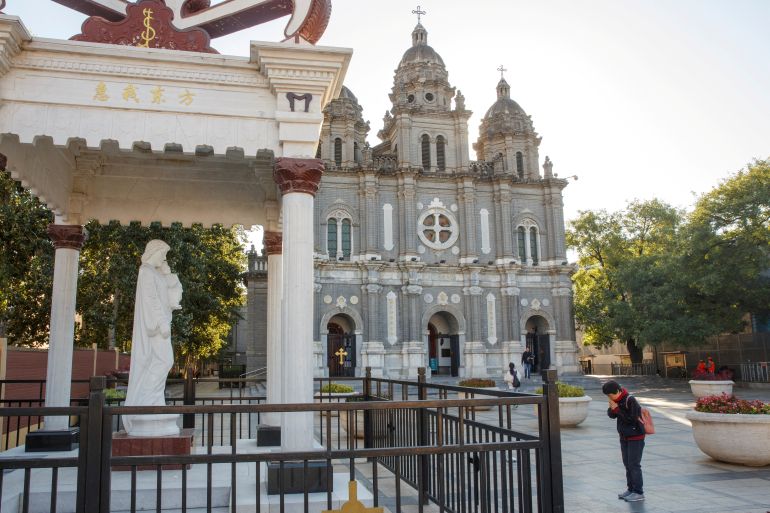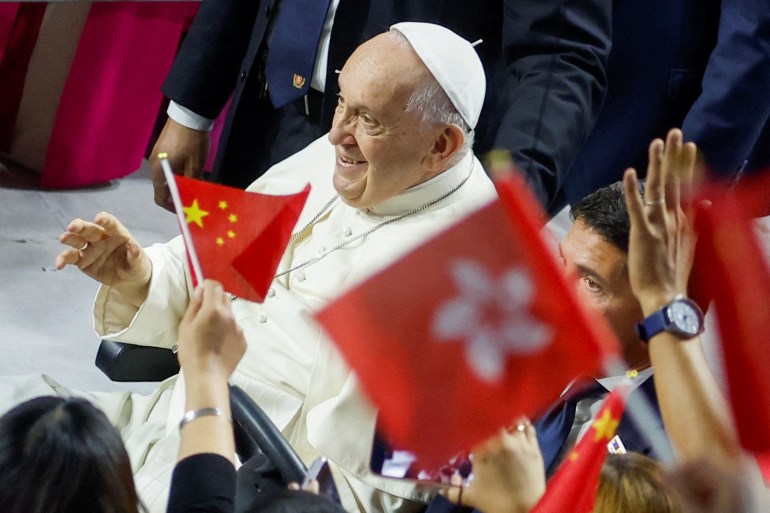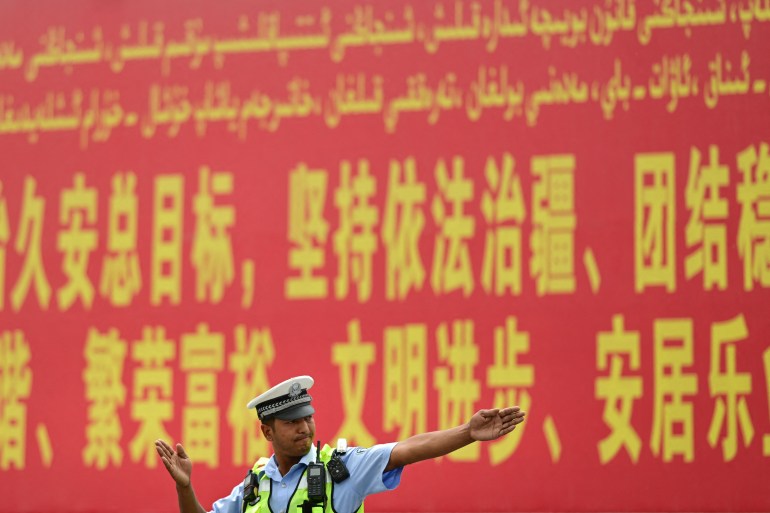‘A jealous god’: China remakes religions in its own image
Authorities are violating religious freedoms across China as the leadership seeks to assert control.

When the pope is on official business, it is customary for him to send a greeting from the papal aeroplane to the heads of state of the countries he flies over.
As Pope Francis’s plane cruised above China on September 1, en route to Mongolia for the first papal visit in history, the head of the Catholic Church dispatched a telegram to Chinese President Xi Jinping in which he extended well wishes to Xi and the Chinese people.
Keep reading
list of 4 itemsTibet’s Dalai Lama marks 88th birthday, prays for world peace
Clashes at ancient China mosque over planned demolition
US charges two over China-backed plot against Falun Gong
Below, in the eastern Chinese city of Fuzhou, 58-year-old restaurant owner Theresa Liu was praying for the pope’s safe arrival in Mongolia.
“He is not a young man so I was praying for him to have a smooth journey and arrive in good health,” she told Al Jazeera.
Liu describes herself as a devout Chinese Catholic.
She would have liked to travel to Mongolia as some Chinese Catholics did but the workload at her Sichuan-inspired restaurant in Fuzhou did not allow her to go.
“Besides, I am afraid that a visit [for the purpose of seeing the pope] would get me in trouble with the [Chinese] government,” Liu said.
Two people were allegedly detained by the Chinese authorities for organising a group pilgrimage from China to Mongolia in connection with the pope’s visit.
Another group of Chinese Catholics made up excuses to enter Mongolia for the pope’s visit but were concerned about potential consequences.
According to Liu, pressure is mounting on China’s Catholics who number as many as 10 million people in a country that is officially atheist.
“The government is trying to control everything about our religion – how our churches look, who our priests are, the way we pray,” Liu said.

And she is convinced that it is not just Catholic communities that are feeling the weight of the Chinese party-state.
“I think different religious groups all over China are having trouble with the government.”
‘Just a piece of paper’
Officially, Article 36 in the Constitution of the People’s Republic of China guarantees freedom of religion for all Chinese citizens.
“But the constitution is just a piece of paper,” Xi Lian, a professor at Duke Divinity School in the United States whose research centres around China’s modern encounters with Christianity, told Al Jazeera.
“In real life in China, we are not seeing the government respecting freedom of religion.”
In recent years, few have felt this more strongly than the Muslim Uighurs in the western Chinese region of Xinjiang.
Muslims in Xinjiang have been detained for attending religious events, praying, wearing a headscarf or having a beard. More than 1 million Uighurs have served time in a detention camp. At the same time, upwards of 16,000 mosques have been damaged or destroyed in Xinjiang since 2017.
South of Xinjiang in Tibet, the authorities have restricted the practice of Tibetan Buddhism over the last decade. Religious festivals have been banned more frequently and government employees, teachers and students have been barred from participating in religious activities.
Tibetan schools have also been closed and the Chinese government has been accused of trying to forcibly assimilate more than 1 million Tibetan children through state-run boarding schools in an attempt to “eliminate Tibet’s distinct linguistic, cultural and religious traditions”.
The encroachment on religious customs and spaces extends beyond the ethnic minorities in western China.
The Hui are a group of about 11 million Chinese-speaking adherents of Islam scattered over much of China. Hui mosques and cemeteries across China have been demolished or subjected to “renovations” in recent years.
In May, thousands of Hui residents in the village of Najiaying in Yunnan Province reportedly feared that a demolition was under way when they found their mosque closed for noon prayers, guarded by police and surrounded by cranes. The locals and the police clashed and in the days that followed, many were arrested.
“Hui communities have also been prohibited from using the Arabic script on religious sites, religious leaders have been forbidden from addressing certain topics in religious sermons and definitions of halal food derived from religious authorities have been replaced by state definitions,” David Stroup, an expert on the Hui at the University of Manchester, told Al Jazeera.

Christian communities have had similar experiences.
In 2016, thousands of crosses were torn down from churches throughout Zhejiang Province. The authorities have also broken up congregations that have not been approved by the state, while church leaders have been arrested and jailed.
‘A jealous god’
President Xi Jinping visited Xinjiang in August where he lauded the “achievements made in various tasks in Xinjiang” and urged officials to “more deeply promote the ‘sinicisation’ of Islam”.
Over the years, Xi has regularly called for the “sinicisation” of religion in China.
“However, it is important to note that the ‘sinicisation”‘ of religion has occurred in China for centuries,” said Duke’s Lian.
As different religions have been adopted in China, as in many other countries, they have organically evolved to fit with local traditions, customs and the changing of the times.
But Xi’s sinicisation means something different.
The first time the Chinese leader publicly spoke of it was at a conference in Beijing in 2015, during which he also declared “that the Communist Party could give active guidance to religions so that they could adapt themselves to socialist society, adhere to the direction of sinicised religion, and increase the standard of the regulations controlling religion”.
It was in the years afterwards that crosses were demolished in Zhejiang and the first detention camps were established in Xinjiang.
“The current wave of sinicisation is driven by the party-state as it seeks to change religion in China, so it aligns with the Communist Party’s and Xi Jinping’s interpretation of dominant Chinese culture and socialist core values,” Stroup said.
It manifests in the demolition of domes, crosses and minarets and their replacement by Chinese-styled tiled roofs and Buddhist-styled pagodas. It involves mandatory patriotic education for Buddhist, Christian and Muslim clergy and it entails party-approved sermons and prayers.
For those religious communities that recognise a religious authority beyond China’s borders, sinicisation is also about weakening ties to such an authority to protect the Chinese Communist Party (CCP).
“The communist god is a jealous god that does not want anyone to compete with its power,” said Duke’s Lian.
As an example, the Tibetan Buddhist leader-in-exile, the Dalai Lama, continues to be portrayed as a separatist by the CCP and the Chinese authorities have tried to discredit and isolate him internationally.
The pope has also had his religious authority undermined in China.
After decades of Catholic division in China. between an underground flock loyal to the Pope and a state-backed official church, the Vatican the CCP agreed to a landmark bilateral pact in 2018 by which both sides would recognise the pope as the supreme leader of the Catholic Church.
However, the Vatican accused the Chinese authorities of violating the pact in April by unilaterally appointing a new bishop for Shanghai even after it had been agreed that the final decision in appointing bishops lay with the pope.
Analysts say it is politically naive if the Vatican believes it can make a deal with Beijing that would grant the Catholic Church increased religious autonomy.
“And it shows an inability to read the political landscape in China,” Lian said.
Keeping faith behind closed doors
When Liu, who preferred not to share her real name for fear of reprisals, reads the political landscape in China, she sees the country headed towards increased religious intolerance.
This saddens her but she was comforted by the fact that on his last day in Mongolia, the pope sent a message to Chinese Catholics.
“It is good that he remembers us,” she said.
Liu is part of the sizeable Catholic community that recognises the authority of the pope and refuses to let the Chinese authorities intervene in their religious affairs.
She does not support the 2018 pact and is against the Vatican’s attempts at working with the CCP.
“The Chinese government does not respect any other authority than their own, so I don’t think they will follow any such agreements.”
While Liu believes there was a time in the mid-2000s when it seemed they could be “be more open about our faith”, that is no longer the case.
“Just before the pandemic my congregation and I went underground again,” she said.
Stroup believes that most Hui communities will respond to Xi’s sinicisation programme by similarly keeping their heads down and trying to weather the storm the best they can.
“Although we do see people who are willing to protest bulldozers knocking down minarets, for example, I don’t expect that we will see months of resistance,” he said.
Liu thinks defiance and sporadic acts of protest will only make things worse.
Instead, she believes it is better to be discreet and keep religious affairs behind closed doors.
“If you are patient in the dark, you will eventually get to see the light.”